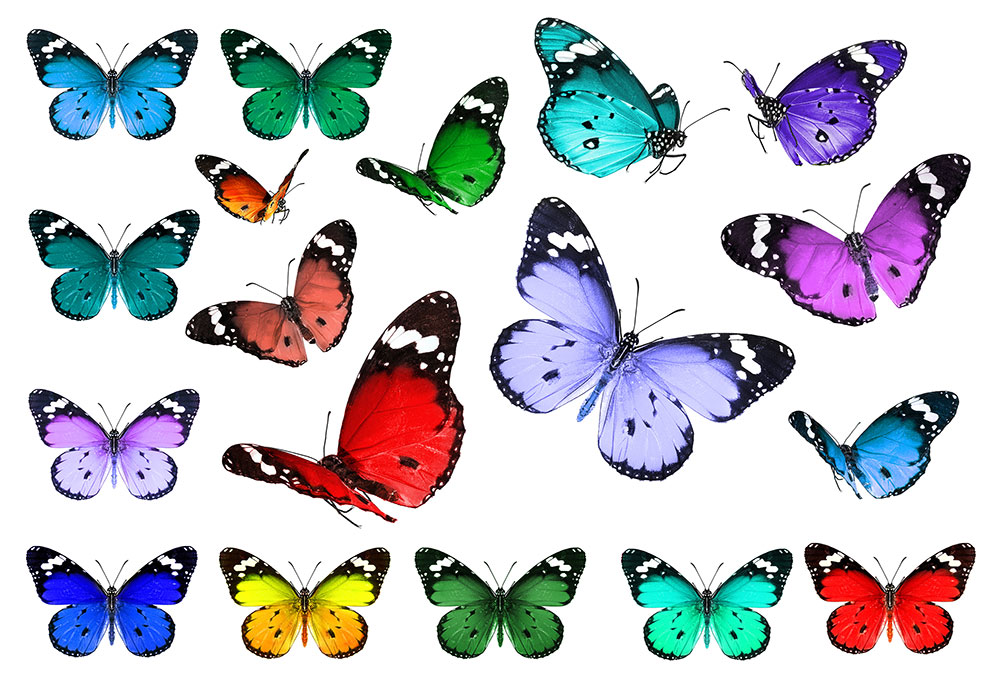Have you ever seen a kaleidoscope of butterflies where hundreds of butterflies display patterns and shapes in vivid colors and change rapidly? It is brilliant! In my new book Body Esteem: Piece of Cake and Peace of Mind I use butterflies as a metaphor to describe how our bodies are extraordinarily unique and evolve over time. There is a great deal of symbolism associated with butterflies and throughout the world butterflies represent endurance, change, hope, and life. Butterflies also represent celebrations, weddings, life, and our journeys. Neiman Marcus uses butterflies as their logo and if you are climbing their escalator you may see a ray of lovely white butterflies dangling from the ceiling.
A flight of butterflies like the Monarchs travel on a journey much like what we as humans experience in our lifespan…discovery, fear of the unknown, and they flutter their wings to flee an enemy and protect themselves. Butterflies are exquisite and my mother loved them so much that she requested a butterfly house one Mother’s Day. Although she adored nature, she was particularly enchanted by the intricate differences in shapes, colors, and sizes found in butterflies.
Similarly, as human beings our bodies are autonomous and no two bodies are alike. In fact, our bodies will evolve and change as we age. I recently saw a post on social media where a caterpillar and butterfly were having cocktails and the caterpillar says to the butterfly “You have changed” and the butterfly responds “We are supposed to”. As challenging as it may be to accept that physiologically one typically gains weight as they age, if you anticipate bodily changes it may be easier to cope with this issue. For example, 90% of women experience weight gain between the ages of 35 and 55, not coincidentally, during perimenopause and menopause. Our bodies naturally lose muscle mass tissue as we age.
One method to counteract some of this weight gain is to increase your aerobic activity and consume calories within your metabolic rate. Avoid chronic dieting which may slow down your metabolism and creates a weight gain later in life. A desired and healthy weight range and body composition can be achieved, but it may require more effort such as extending your workout time. But, after the age of 35, it is important to incorporate balanced nutrition, an exercise prescription, and balance your hormones. As your age progresses, your hormones may not be regulated properly, but you can systematically measure the imbalance that perimenopause and menopause cause through your blood work. This is absolutely necessary for your psychological and physical health.
Properly balanced hormones can help one maintain or prevent a weight gain. Unbalanced hormones makes one prone to gain weight, especially with too much cortisol (stress hormones) or too little progesterone, testosterone or estrogen. The average weight gain is gradual, about 10 to 15 pounds starting in perimenopause and averaging to about a pound a year. However, women who experience early menopause as a result of surgical menopause (hysterectomy) tend to gain the weight at an even more accelerated pace. Trust me because I speak from life experiences as I was diagnosed with endometriosis and had corrective surgery at age 20, a hysterectomy at age 21, and my ovaries were removed at age 23. I have been on hormone replacement therapy since this age and currently had two more surgeries to remove endometriosis and scar tissue. I was recently diagnosed with hypothyroidism so having my hormones and thyroid checked is crucially important. My personal experiences have allowed me to be more empathetic and acquire the knowledge I need to educate myself and others on the significance of hormonal balance as it relates to body esteem.
Menopausal weight gain tends to be in the abdomen area as opposed to the hips, thighs, and buttocks since there is an enzyme that carries adipose tissue (fat) to this physical region. But, have no fear since you can plan, prevent, and outsmart some of this change. If your hormones are properly balanced you will feel energized and vital as you age and certainly tip the scales in your favor. Strive to avoid the hormone fluctuations in perimenopause that directly impact your mood, appetite, fat storage, and metabolism. That is a thumb’s up like for you as you age gracefully!
Our nutrition constitutes 70% of our physical well-being, exercise and quality of life is approximately 25%, and hormones are 5%. Seek out a treatment plan with a gynecologist who is skilled in hormone regulation and can objectively measure your hormone levels through your bloodwork rather than a doctor who provides a random prescription based on norms that may not be the exact dosage for your body. Educate and enlighten yourself on the facts so you can enjoy Act II as much or more than Act 1! Analogous to the journey of a kaleidoscope of beautiful butterflies, learn to embrace your autonomy and your body esteem will soar!
